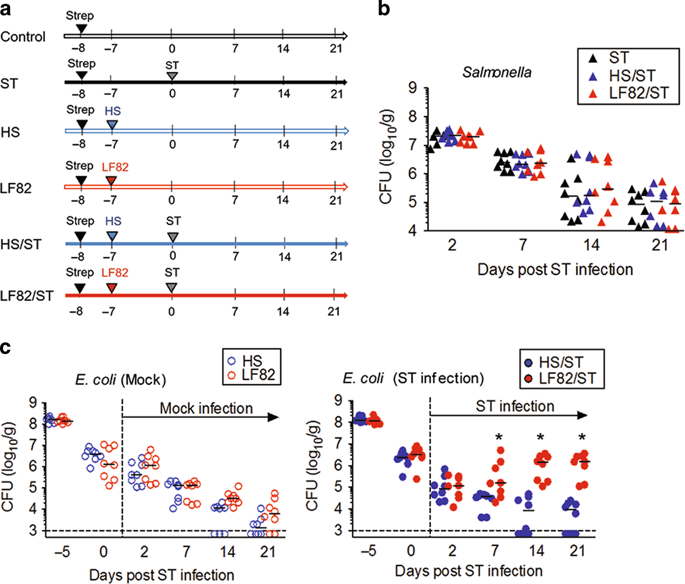Mucosal Immunology ( IF 7.9 ) Pub Date : 2019-02-11 , DOI: 10.1038/s41385-019-0138-4 Jin Imai 1, 2 , Sho Kitamoto 1 , Kohei Sugihara 1 , Hiroko Nagao-Kitamoto 1 , Atsushi Hayashi 1, 3 , Tina L Morhardt 1, 4 , Peter Kuffa 1 , Peter D R Higgins 1 , Nicolas Barnich 5 , Nobuhiko Kamada 1

|
Intestinal fibrosis is a severe complication in patients with Crohn's disease (CD). Unfortunately, the trigger leading to the development of intestinal fibrosis in the context of CD remains elusive. Here, we show that colonization by a CD-associated pathobiont adherent-invasive Escherichia coli (AIEC) promotes the development of intestinal fibrosis. Exogenously inoculated AIEC strain LF82 and commensal E. coli HS were gradually eradicated from the intestine in healthy mice. In Salmonella- or dextran sodium sulfate-induced colitis models, AIEC exploited inflammation and stably colonize the gut. Consequently, persistent colonization by AIEC LF82 led to substantial fibrosis. In contrast, commensal E. coli HS was unable to derive a growth advantage from inflammation, thereby failing to colonize the inflamed intestine or promote intestinal fibrosis. AIEC colonization potentiated the expression of the IL-33 receptor ST2 in the intestinal epithelium, which is crucial for the development of intestinal fibrosis. The induction of ST2 by AIEC LF82 was mediated by flagellin, as the ΔfliC mutant failed to induce ST2. These observations provide novel insights into pathobiont-driven intestinal fibrosis and can lead to the development of novel therapeutic approaches for the treatment of intestinal fibrosis in the context of CD that target AIEC and/or its downstream IL-33-ST2 signaling.
中文翻译:

病原体介导的鞭毛蛋白介导的 IL-33-ST2 信号激活促进肠纤维化
肠纤维化是克罗恩病(CD)患者的严重并发症。不幸的是,在克罗恩病中导致肠纤维化发展的触发因素仍然难以捉摸。在这里,我们发现 CD 相关致病生物粘附侵袭性大肠杆菌(AIEC) 的定植可促进肠道纤维化的发展。外源接种的 AIEC 菌株 LF82 和共生大肠杆菌HS 逐渐从健康小鼠的肠道中根除。在沙门氏菌或葡聚糖硫酸钠诱导的结肠炎模型中,AIEC 利用炎症并稳定地定植于肠道。因此,AIEC LF82 的持续定植导致了严重的纤维化。相比之下,共生大肠杆菌HS 无法从炎症中获得生长优势,因此无法在发炎肠道中定殖或促进肠道纤维化。 AIEC 定植增强了肠上皮细胞中 IL-33 受体 ST2 的表达,这对于肠纤维化的发展至关重要。 AIEC LF82 对 ST2 的诱导是由鞭毛蛋白介导的,因为 Δ fliC突变体不能诱导 ST2。这些观察结果为病理生物驱动的肠道纤维化提供了新的见解,并可能导致开发针对 CD 背景下针对 AIEC 和/或其下游 IL-33-ST2 信号传导的肠道纤维化的新治疗方法。











































 京公网安备 11010802027423号
京公网安备 11010802027423号